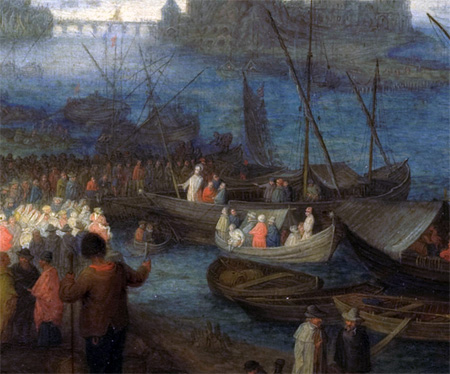Jesus first gained fame as a healer and wonder-worker. If making the blind see and the lame walk weren’t enough, surely the reputation of turning water into wine or feeding thousands would be enough to make anyone popular. But the real purpose of miracles seems to have been to draw crowds and make them more receptive to his teachings, at which he excelled. Jesus verbally dazzled his listeners, posing puzzling questions to his audience, startling them with surprising assertions, but above all told stories so vividly that many became part of our common culture.
Uniquely perhaps among religious founders, Jesus mainly relied on parables — that is, brief tales with a concealed meaning — to get his message across to the people. There are only around thirty such unique stories recorded in the New Testament. All are found in the Synoptic Gospels — Matthew, Mark, and Luke. There are none at all in John’s Gospel, although it includes many of his most enigmatic and even shocking figures of speech. Nor are there any in John’s Revelation, despite its abundance of vivid and frightening images, nor in any of the Epistles. However, several of the better known parables are mentioned in the enigmatic Gospel of Thomas. That mysterious book didn’t even make it into the Bible, but it shows that Jesus’ stories were remembered in various communities that prized his teachings.
The number of parables is hard to pin down due to two reasons. First, Jesus sprinkled figures of speech throughout his addresses, so sometimes his one-liners are counted as parables, sometimes not. Secondly, while the Synoptics shared many of the same stories, some versions are so different that they could be thought of as unique — the parables of the talents [Matt. 25:14-30] and the pounds [Luke 19:11-27], are one such pair, while the parable of the good and wicked servants is different in all three places that it appears [Matt. 24:45-51, Mark 12:34-37, Luke 12:42-46].
Yet only his disciples were ever told their real meaning.
With many such parables he spoke the word to them, as they were able to hear it. Without a parable he didn’t speak to them; but privately to his own disciples he explained everything.[Mark 4:33-34]
But why did Jesus rely on them so much?
The disciples asked about this very point early on:
He answered them, “To you it is given to know the mysteries of the Kingdom of Heaven, but it is not given to them. For whoever has, to him will be given, and he will have abundance; but whoever doesn’t have, from him will be taken away even that which he has.Therefore I speak to them in parables, because seeing they don’t see, and hearing, they don’t hear, neither do they understand.In them the prophecy of Isaiah is fulfilled, which says,
‘By hearing you will hear,
Seeing you will see
and will in no way perceive;
or this people’s heart has grown callous,
their ears are dull of hearing,
and they have closed their eyes;
hear with their ears,
understand with their heart,
and would turn again,
and I would heal them.’ [Matt. 13:10-15]
This is profoundly disturbing. It’s even more troubling when that reference to Isaiah is checked out. This incident takes place during a vision of God on his throne when Isaiah is called to be a prophet:
I heard the Lord’s voice, saying, “Whom shall I send, and who will go for us?”
Then I said, “Here I am. Send me!”
He said, “Go, and tell this people,
‘You hear indeed,
but don’t understand.
You see indeed,
but don’t perceive.’
Make the heart of this people fat.
Make their ears heavy, and
understand with their heart,
and turn again, and be healed.”Then I said, “Lord, how long?”
He answered,
“Until cities are waste without inhabitant,
houses without man,
the land becomes utterly waste,
and Yahweh has removed men far away,
and the forsaken places are many within the land.
If there is a tenth left in it,
that also will in turn be consumed,
as a terebinth, and as an oak, whose stump remains when they are cut down;
so the holy seed is its stock.” [Is.6:11-13]
Shockingly, Jesus, the Savior, like the wrathful God back in Isaiah’s day, explicitly states he doesn’t want the unworthy to understand and repent but to be destroyed. In fact, he deliberately intended to confuse and deceive them so that they understood even less.
Dangerous misdirections
Like the prophet Nathan confronting the king with his crimes, this misdirection may have been necessary for Jesus’ own protection. Because the Gospel story does not begin with the parable, but the circumstances that led him to use it:
That same day Jesus went out of the house and sat beside the sea. And great crowds gathered about him, so that he got into a boat and sat there; and the whole crowd stood on the beach. [Matt. 13:1-2]
The site is thought to have been a small semi-circular cove on the Sea of Galilee backed by a hill. Not only would a boat anchored near the shore provide a perfect podium to address a large crowd, but also security. For it was not the size of the crowds that mattered as much as their proximity.
That this was mainly for Jesus’ safety is shown by the fact that it was an early practice of his:
A great multitude, hearing what great things he did, came to him. He spoke to his disciples that a little boat should stay near him because of the crowd, so that they wouldn’t press on him. For he had healed many, so that as many as had diseases pressed on him that they might touch him. [Mark 3:7-10]
This, then, was the setting for the first major parable Jesus told. It is one of the very few where we have any of the explanation that he gave to his disciples. This is the famous Parable of the Sower, providing the text for countless sermons down the centuries:
He spoke to them many things in parables, saying, “Behold, a farmer went out to sow. As he sowed, some seeds fell by the roadside, and the birds came and devoured them. Others fell on rocky ground, where they didn’t have much soil, and immediately they sprang up, because they had no depth of earth. When the sun had risen, they were scorched. Because they had no root, they withered away. Others fell among thorns. The thorns grew up and choked them. Others fell on good soil and yielded fruit: some one hundred times as much, some sixty, and some thirty.” [Matt. 13:2-8]
So what’s dangerous about that? Here is the interpretation he gave the disciples:
“Hear, then, the parable of the farmer. When anyone hears the word of the Kingdom and doesn’t understand it, the evil one comes and snatches away that which has been sown in his heart. This is what was sown by the roadside. What was sown on the rocky places, this is he who hears the word and immediately with joy receives it; yet he has no root in himself, but endures for a while. When oppression or persecution arises because of the word, immediately he stumbles. What was sown among the thorns, this is he who hears the word, but the cares of this age and the deceitfulness of riches choke the word, and he becomes unfruitful. What was sown on the good ground, this is he who hears the word and understands it, who most certainly bears fruit and produces, some one hundred times as much, some sixty, and some thirty.” [Matt. 13:18-23]
What Jesus basically told his disciples is that for those who truly understood, great things were possible. But for various reasons most of the people listening would not get it and thus would not be saved. Jesus would not have been smart, prudent, or kind to tell the hopeful who had come out to hear him that they just didn’t have what it takes. Better he kept them interested, since some effort had to be made to understand a parable. That might have intrigued the few who could grasp the real message and take it to heart.
Jesus told parables because of the hazards involved in plainly speaking the truth. Those dangers would only grow with his fame, and parables and figures of speech would eventually pose dangers of their own. After all, prophecy is a dangerous business. And when mixed with politics, doubly so.

